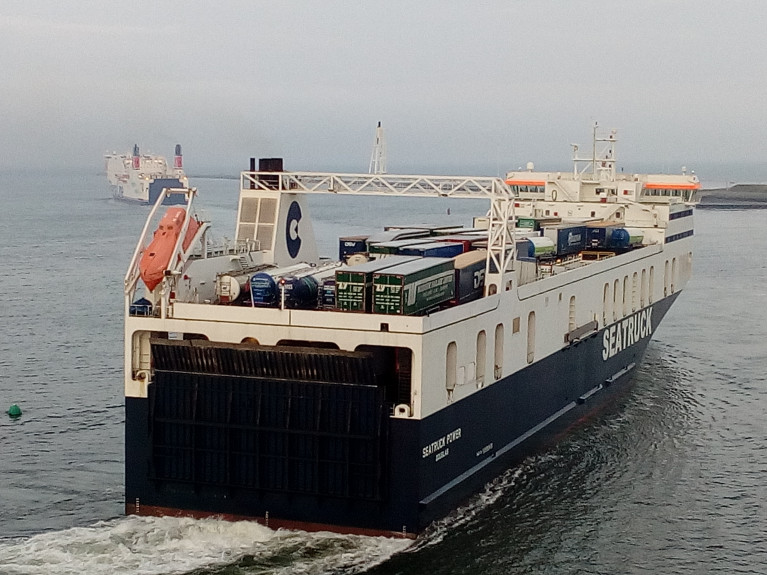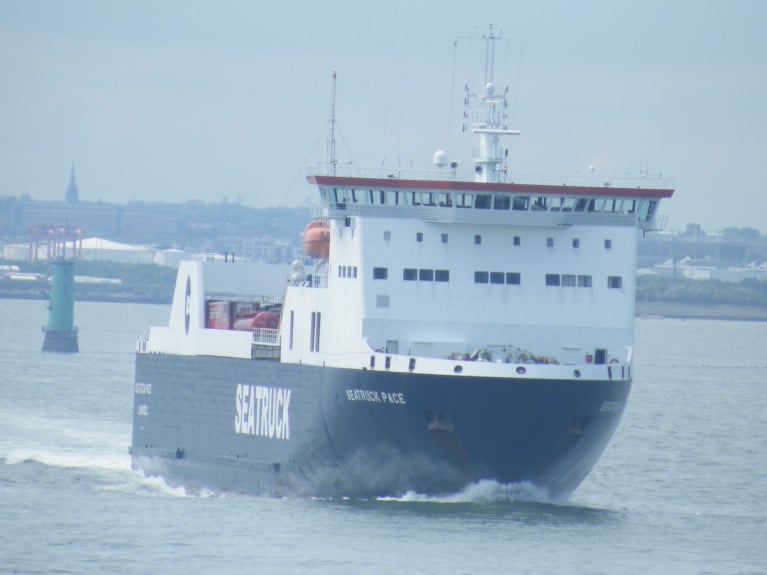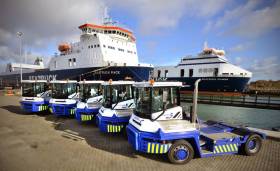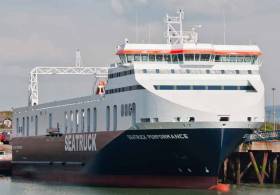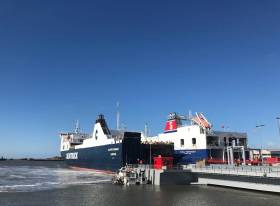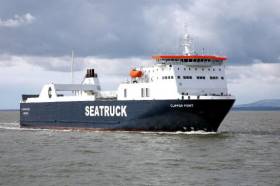Displaying items by tag: Seatruck
Dublin Port Company Confirms Stena Line & Seatruck Ferries for Terminal 5
Dublin Port Company (DPC) has today announced the outcome of the selection process that will see Terminal 5 in Dublin Port licensed to Stena Line and Seatruck Ferries. Stena Line will operate a new Dublin-Birkenhead (Liverpool) service while Seatruck Ferries and parent company CLDN will further develop their Dublin-UK services as part of this new shared freight terminal agreement.
In September 2023 DPC called for proposals from interested ferry lines to service west coast English or Welsh ports (excluding Dublin-Holyhead) out of Dublin following confirmation that P&O (which operated from Terminal 5 in Dublin Port) would exit the Dublin-Liverpool route by year end.
Stena Line’s new freight service between Dublin and Birkenhead (Liverpool) commences mid-February 2024, while Seatruck Ferries will move its Dublin-Heysham freight service within Dublin Port to Terminal 5 in January 2024.
DPC’s decision to award a shared licence to both Stena Line and Seatruck Ferries at Terminal 5 maximises the port’s existing infrastructure by pushing more truck and container freight through the terminal’s footprint. The move further supports DPC’s objective of adding capacity where possible, given the ongoing constraints on port lands, with Dublin Port already running close to capacity.
Barry O’Connell, CEO, Dublin Port Company, said: “It’s essential for Ireland’s economy that we have strong availability and competition on direct shipping routes between Dublin Port and the UK. We are pleased to welcome Stena Line’s new Dublin-Birkenhead route which brings choice to the market, and to continue working with Seatruck Ferries and CLDN on growing its Dublin-Heysham service.”
Stena Line’s new freight service
Stena Line’s new freight service will initially operate with one ship departing Dublin early in the morning and making the return journey from Birkenhead in the evening.
Stena Line already operates from Dublin Port to Holyhead and from Birkenhead to Belfast, and this new service will complement these existing routes. The company is currently assessing ship deployment options ahead of the mid-February start date in Dublin.
Paul Grant, Trade Director (Irish Sea), Stena Line, said: “We are very excited to re-establish this vital trade corridor with our new freight route between Dublin and Birkenhead which will further increase crossing options for our hauliers and their customers. With Stena Line now operating two routes out of both Dublin Port and Birkenhead, we are establishing key logistics hubs connecting freight flows across the Irish Sea and creating efficiencies for port users. We have invested significantly in our Birkenhead operations in recent years and as a result have seen growth on our Belfast to Liverpool service. We are confident that this new service will prove popular, offering more choice for our freight customers on both sides of the Irish Sea.”
Seatruck’s growing freight business
Seatruck Ferries and CLdN have been steadily expanding services into and out of Dublin in recent years. CLdN currently operates direct services from Rotterdam, Zeebrugge and Santander, while Seatruck Ferries operates the Heysham and Liverpool routes. As a result of the licence, Seatruck Ferries will move its Dublin-Heysham service to Terminal 5 in early 2024. All other CLdN services, including the Seatruck Ferries services to and from Liverpool, will continue to operate from Terminal 4. CLdN will also add a vessel to the Dublin-Liverpool route, providing extra sailings on Tuesdays, Wednesdays and Thursdays, bringing the total number of daily departures from three to four in each direction.
Alistair Eagles, Managing Director Seatruck Ferries, said: “We very much welcome this decision by Dublin Port. CLdN and Seatruck’s unaccompanied freight business on the Irish Sea has been growing steadily over recent years and more than 70% of all Irish Sea ferry freight now moves on an unaccompanied basis. The use of both Terminal 4 and Terminal 5 will enable us not only to further increase capacity but also to optimise the efficiency of our operations at the port. We look forward to growing our links with DPC as a stable and reliable partner and to further expanding our offer to customers.”
CLdN to Acquire Irish Sea Operator Seatruck Ferries from Clipper Group
European RoRo ferry operator CLdN based in Luxembourg, has today announced it has entered into an agreement to acquire all shares in Seatruck Ferries Holding Ltd. from Clipper Group.
The agreement involves 8 purpose-built vessels of Seatruck Ferries which is the leading RoRo operator on the Irish Sea, transporting close to 20% of the region’s seaborne cargo volumes.
CLdN CEO Florent Maes comments: “We are delighted with the agreement, which is in line with our overall strategy of expanding current trades and developing new routes. Seatruck Ferries is an excellent company with a great route network and a strong business model. Seatruck will be a valuable addition to CLdN’s comprehensive route network and particularly adds to our presence in the UK and Irish markets. We look forward to welcome our new colleagues to the CLdN team and together develop new opportunities for the wider group.”
The parties have agreed not to disclose the transaction price.
The divestment of Seatruck Ferries allows Denmark-based Clipper Group to devote all financial and managerial resources to further strengthening its global dry cargo business.
Clipper Group CEO Amrit Peter Kalsi comments: “Given the continued robust performance by Seatruck, we concluded that this was the right time to divest the company. Following a competitive process, we are very pleased to be handing over the baton to a strong, long-term, industrial owner as CLdN. We now look forward to focus 100% on our dry cargo core business. With a much stronger balance sheet, we are well positioned to proactively pursue market opportunities.”
CLdN’s contemplated acquisition of Seatruck Ferries is subject to regulatory approval from the Irish competition authorities, expected before year-end. After closing, the Seatruck operation will continue to run under the Seatruck Ferries brand with the existing management team lead by Alistair Eagles.
Seatruck Ferries has shown great resilience through the challenges caused by COVID-19 and Brexit, where the company has consolidated its market-leading position on the Irish Sea. Operating profit improved in 2021 and earnings are expected to further improve in 2022 as the joint impacts of COVID-19, Brexit and driver shortages are expected to accelerate growth in the unaccompanied trailer sector.
CLdN was advised by Baker McKenzie. Clipper Group was advised by Moelis & Company and Gorrissen Federspiel.
Seatruck Says Services Will Not be Affected By Strike Action Planned at Port of Liverpool
Seatruck Ferries has issued an update on its website to advise its customers that the Irish Sea operator is aware of strike action that is to affect the Port of Liverpool from next week, writes Jehan Ashmore.
The strike action is confined to the UK port's 'containers division' and which is due to commence at 06:00 on Monday, 19 September (and continue to 3 October, as Afloat previously reported due to dock workers raising issues over a pay rise).
The statement added that the action will not impact Seatruck services, nor does the operator anticipate any traffic disruption at their Merseyside terminal which Afloat adds is located at Brocklebank Dock.
Seatruck will inform of any change with updates on the Dublin-Liverpool route which caters mostly for unaccompanied freight trailer units. This method according to the ro-ro company accounts for 71% of the total Irish Sea ferry freight trade that does not involve a driver on board during the crossing.
Afloat adds the Merseyside terminal that links to the No. 5 terminal in Dublin Port is served by a trio of ro-ro freight ferries. This currently involves a pair of FSG class vessels, Seatruck Progress (photo above) and Seatruck Power, each with a 150 unit capacity and a single P class, Clipper Point which can convey 120 units.
In addition to freight vehicles, Seatruck also transport cars and motorhome passengers on the central Irish Sea corridor connection between the Irish capital and the north-west England cityport.
The ro-ro freight specialist also operates Dublin-Heysham and Warrenpoint-Heysham which are not affected by the planned industrial strike action.
Seatruck, the Irish Sea freight-only operator announced the return of shared cabins following removal of social distancing rules introduced during the Covid pandemic that required drivers instead to use single cabin occupancy, writes Jehan Ashmore.
The relevant authorities have now removed these restrictions and Seatruck have taken the decision along with their ship management and H&S departments to reintroduce shared cabins.
As of next Monday, 2 May, all 12 driver (accompanied trailers) on their 150 freight trailer unit capacity FSG class ro-ro vessels must be prepared to share cabins.
According to Seatruck they will of course accommodate a single cabin occupancy where available.
The FSG class vessels are currently deployed on the following routes, Warrenpoint - Heysham and Dublin - Liverpool (morning and evening vessels).
The company also operate a third route, Dublin-Heysham in which Afloat conducted an on board interview with the Captain of the P-class ro-ro freighter Seatruck Pace.
Last year, Seatruck which is the only dedicated freight operator on the Irish Sea, celebrated their 25th anniversary when its launched its first route to meet the transportation needs of the haulage industry.
Across the Seatruck route network, 350,000 trailers a year ranging from tippers, tanks, flats, refrigerated and hazardous units are handled by the operator.
Ro-ro freight operator Seatruck Ferries announced today an increase in capacity with an extra two roundtrips on the Irish Sea central corridor Dublin Port-Liverpool route this week.
The new sailings arise from an increased demand which will see the first additional roundtrip sailing depart Liverpool (this afternoon) at 16:00 and returning from the Irish capital tomorrow (Wednesday) morning at 04:00.
Customers will now have the option of 4 departure times from Liverpool on Tuesday and Wednesday and 4 departure times from Dublin on Wednesday and Thursday.
To consult 'weekly' updated sailing schedules click here.
It is only just over a month ago when Seatruck announced the resumption of passenger (motorist-only) sailings following lifting of Covid-19 travel restrictions. Customers have the entire operator's Irish Sea route network to choice from of the following routes: Dublin-Liverpool, Dublin-Heysham and Warrenpoint-Liverpool.
Combined there are 7 ships on these routes served by the 'P' series and larger 'Heyham-Max'/FSG ro-ro freighters. The fleet has a freight capacity ranging from 100-135 un-accompanied trailers and 12 passengers can be accommodated on each ship.
Seatruck Further Increase Capacity on Dublin-Liverpool Service
#FerryNews - Irish sea freight operator, Seatruck Ferries have further increased capacity on their Dublin to Liverpool service. In addition sailing frequencies on the central Irish Sea corridor route.
The smallest vessel on the route the Clipper Ranger, has been replaced by a larger P series vessel, (Afloat identified as Clipper Pennant) offering almost twice the capacity. At the same time additional Friday sailings have been introduced meaning that Seatruck now operate 44 sailings per week on what is their busiest Irish Sea service.
The introduction of the larger Clipper Pennant is the next stage in Seatruck Ferries’ strategic development plan, with the company now operating 78 departures per week across 3 key routes on the Irish Sea.
Responding to customer feedback, departure times have also been tailored to reflect the changing needs of the Irish market. Seatruck currently move around 20% of the total Irish Sea roro freight volumes.
Driver shortages are causing many operators to reassess their traditional accompanied method. Seatruck Ferries believes in a switch to greater volumes of unaccompanied movements from ports, which reduces road mileage compared with the more traditional transit through Wales or Scotland. Trailer only shipments mean that Seatruck customers can use their drivers and equipment more efficiently.
This positive move will complement the existing Seatruck services operating from Dublin to Heysham and Warrenpoint to Heysham.
As Afloat previously covered, capacity on the Warrenpoint-Heyham route has just been increased by 30% with introduction of sisters Seatruck Performance and Seatruck Precision.
Alistair Eagles, Chief Executive of Seatruck Ferries said: “The recent vessel changes in Warrenpoint have allowed us to cascade additional modern tonnage onto our fast-growing Dublin – Liverpool route. The P series vessel is larger, faster and will improve schedule reliability in inclement weather.
He add "We are seeing unprecedented demand for unaccompanied trailer shipments across our network and with the driver shortage worsening we see this trend continuing. By switching to unaccompanied shipments our customers can ensure that they are using their resources in the most efficient way possible. The Dublin Liverpool route is now serviced by a modern fleet of purpose-built vessels offering unrivalled service for trailer operators with 4 midweek sailings per day in each direction.”
The vessel switch follows exponential growth for Seatruck in recent years with trailer volumes rising by more than 250% since 2007.
A €100 million investment by Seatruck Ferries, the Irish Sea freight specialist, will increase capacity on Warrenpoint to Heysham route by 30%.
Seatruck will deploy two larger freight ferries on the route later this summer, in direct response to growing demand for unaccompanied trailer space and enabling the firm to carry 30,000 additional trailers annually on the key crossing.
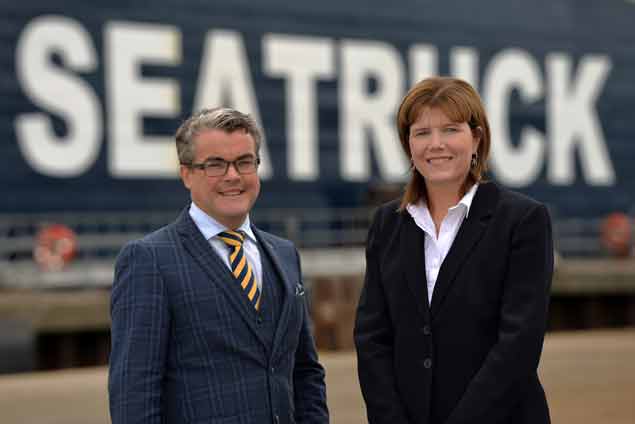 Seatruck Ferries CEO Alistair Eagles joins Clare Guinness, CEO, Warrenpoint Port to announce a €100 million investment to increase capacity on Warrenpoint to Heysham route by 30%.
Seatruck Ferries CEO Alistair Eagles joins Clare Guinness, CEO, Warrenpoint Port to announce a €100 million investment to increase capacity on Warrenpoint to Heysham route by 30%.
The move will see the four-deck Seatruck Precision and Seatruck Performance replace the current three-deck vessels and operate a twice daily service between the ports.
Alistair Eagles, Chief Executive of Seatruck Ferries said:
“Whatever the outcome of the Brexit land border negotiations, Warrenpoint Port will continue to be a cornerstone of the Seatruck operation.
“I clearly remember watching the very first Seatruck sailing from Warrenpoint in 1996. Even back then we had a very strong belief in our business model, our service and our future strategy.
“Adding larger ships to the Warrenpoint route is the next logical step for Seatruck and I have no doubt that it will be very popular providing more unaccompanied trailer space to our growing customer base, as the industry seeks solutions to the ongoing driver shortage.
“I clearly remember watching the very first Seatruck sailing from Warrenpoint in 1996. Even back then we had a very strong belief in our business model"
“The larger vessels underline the need for the Southern Relief Road which will connect Warrenpoint Port directly to the main Belfast-Dublin motorway. Seatruck fully support this key piece of infrastructure.”
In welcoming the announcement, Clare Guinness, Chief Executive of Warrenpoint Port said: “This is a significant investment by Seatruck Ferries and is a clear commitment to Warrenpoint Port and the wider Newry, Mourne and Down district, which will directly benefit from the increase in trade. “We have a strong relationship with Seatruck and the Port is supporting the company with the provision of additional terminal areas. “Our recently launched Masterplan outlined our vision for the development of the Port for the benefit of the wider economy and community. Part of that strategy is to grow freight ferry volumes and this welcome announcement will assist the Port in realising that vision.”
The vessel switch follows exponential growth for Seatruck in recent years with unaccompanied trailer volumes rising by more than 250% since 2007.
Seatruck now operates 76 departures per week across three Irish Sea routes, moving around 20% of the total Irish Sea Roll on Roll off freight volumes.
In Heysham, Peel Ports has recently invested £10m in a new loading ramp to accommodate and improve the Seatruck Ferries operation.
The deployment of the two larger Flensburger-Schiffbau-Gesellschaft (FSG) series vessels which were built in Germany in 2012, will free up the current two ‘P’ series vessel built in 2008.
Heysham Port's New £10m Ro-Ro Ramp Linkspan Berth Installed for Growing Irish Sea Freight
#FerryNews - Heysham Port in recent weeks has had a new ro-ro ramp linkspan installed bringing to three berthing facilities serving the growing Irish Sea trade through the Lancashire port, writes Jehan Ashmore.
The £10m investment by the Peel Ports operated harbour has created a dedicated loading berth and allows a much greater schedule reliability for chief customer Seatruck Ferries and Stena Line.
The ramp linkspan constructed in the Netherlands was towed to the port. At close to 100m long, the ramp is designed to deal with the large 10m rise and fall in tide that is experienced at Heysham.
Seatruck has routes to Warrenpoint, Co. Down and Dublin Port. A twice daily service is operated to Warrenpoint and single sailing to the Irish capital. Together three freight-ferries operate these routes. They are Seatruck Panorama, Clipper Pennant and Seatruck Pace which alone serves the Dublin route.
Rivals, Stena Line operate to Belfast Port, using chartered tonnage from Seatruck. The ro-ro freight ferry on this second of the Heysham-Northern Ireland routes is served by Stena Performer.
According to Seatruck, the funding in Heysham Port, will also see a new pontoon built to support offshore crew transfer vessels. In addition the construction of a new port entrance and various improvements to the port IT and terminal operating systems.
A third port user, Isle of Man Steam Packet operate a passenger and freight service to Douglas. This year-round route is the main service link between the UK and the island.
Increased Seatruck Sailings Launched on Dublin-Liverpool Service
#freightferry - Irish Sea freight-only ro-ro operator, Seatruck Ferries has from today increased capacity by adding Tuesday morning sailings on the core Dublin-Liverpool route, writes Jehan Ashmore.
Due to increased demand, Seatruck Ferries new Tuesday morning sailings on the busy central corridor route, will take the service total to 40 sailings per week.
The particular vessel operating this morning's sailing from Dublin Port is the Seatruck Power. The ro-ro freighter which was completed by FSG, Germany in 2012 has a capacity for 150 freight units spread across 2,166 lane metres.
In total, the operator now offers Irish Sea customers 74 sailings per week, allowing for greater flexibility in the shipment of unaccompanied trailers.
The company also operate Dublin-Heysham and Warrenpoint-Heysham. Among the 10-strong fleet is the 65 unit freight ferry Arrow that is on charter to the Isle of Man Steam Packet Co.
The ship which acts as a relief vessel is currently away from Manx waters due to the dry-docking of a freighter from Condor Ferries, the main operator serving the Channel Islands.
#ContractExtended - Seatruck Ferries an Irish Sea freight-only operator have signed a 10 year extension to their agreement with Warrenpoint Harbour Authority.
The agreement underlines the operators commitment to the port at a time of growing volumes on the Warrenpoint-Heysham route.
A twice daily roll on roll off ferry service connects the Co Down and Lancashire ports that began running in April 1996. Since then the service has gone from strength to strength with a €70m investment in a pair of purpose built ferries introduced in 2007. At the same time Warrenpoint Harbour Authority also provided a new loading ramp and upgraded terminal facilities.
Seatruck are the largest tonnage operator in Warrenpoint and in 2016 the service had a record year with well over 100,000 shipments for the first time in its history. The Seatruck Warrenpoint service saw the fastest percentage freight growth of any Northern Irish ferry service in 2016.
As part of the new agreement Warrenpoint harbour have committed to provide additional terminal space in the port as is required to cope with future growth predictions.
Seatruck specialise in the shipment of unaccompanied trailers on routes which reduce road mileage for operators compared with the more traditional transit through Scotland or Wales. Continued HGV driver shortages, particularly in the UK, are contributing to an increasing market switch to the Seatruck model.
CEO of Seatruck Ferries Alistair Eagles commented; Warrenpoint is where the Seatruck story began and we are absolutely delighted to extend our agreement with the Port and in turn our commitment to the local area. The wider financial benefits of having a successful Port in this area should not be underestimated. Warrenpoint Harbour is the economic heartbeat of Newry and Mourne and more widely on both sides of the border. We now need to ensure that we have the arteries clear to ensure that the blood can flow freely and we welcome the progress being made on the Newry Southern Relief Road.
Chief Executive of Warrenpoint Harbour Authority Peter Conway also commented; “Warrenpoint Port is delighted to continue its long standing business relationship with Seatruck Ferries with the signing of the ten year extension to the contract. Seatruck is a fast growing innovative Ferry operator with a long and successful history at Warrenpoint. Together both companies hope to continue to grow the business and to provide and develop this modern cross channel Roll on Roll off service. Seatruck is the port’s largest customer and this new deal demonstrated its commitment to the port and the region for the long term".
He added "As Northern Ireland’s second general cargo port Warrenpoint Harbour is a major economic driver for its local region and its position half way between Dublin and Belfast on the island of Ireland is a major benefit in attracting business. The port continues to lobby for the construction of the Newry Southern Relief Road to further improve access to the major road network.”



























